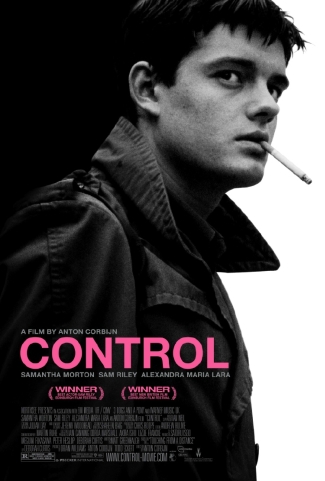
CONTROL
UK, 2007, 121 minutes, Black and white.
Sam Riley, Samantha Morton, Craig Parkinson, Joe Anderson, Alexandra Maria Lara, Harry Treadaway.
Directed by Anton Corbijn.
A portrait of the lead singer of the group Joy Division, Ian Curtis.
Much of the interest in this film will be determined whether one has heard of the 1970s UK band Joy Division or knows their records. If the answer is yes, then it fills in the background as well as focussing on Ian Curtis (rather than his music, which is featured but not put at the centre of the film). If the answer is no, then it depends on how interesting the characters are found to be.
The director is celebrity photographer Anton Corbijn who says that one of the reasons for his coming to live in England from his native Holland in 1979 was Curtis and Joy Division. He also photographed the group not long before Curtis’ untimely death in May 1980 at the age of 23.
The biographies of rock stars are usually full of colour, glamour, loud music and those traditional accompaniments of rock’n roll, sex and drugs. Compared with these, Control is definitely austere.
Corbijn has opted for black and white photography. This is an aesthetic choice which drains the story of any glamour whatsoever and immerses it in a real, sometimes gritty world. Curtis came from Macclesfield, near Manchester, and lived there until he died. This is a very, very ordinary world of Lancashire streets, local shops, small clubs in Manchester and Liverpool. This was the life Curtis was used to – he died before the planned trip to the US.
Curtis comes across as something of a daydreamer with a love for poetry and music – and some questions about existence (with which the film opens). We see him at school, at home with his parents, taking out Deborah whom he married at age nineteen, at the birth of his child, singing with the group, dealing with entrepreneur Tony Wilson (the subject of Michael Winterbottom’s 24 Hour Party People which used the exact opposite aesthetic of this film). But, Curtis is quite morose, becomes absorbed in his singing (and the awkward characteristic arm gestures of marching when he sang), is afraid of his child, distant from his wife – and then falling in love with a Belgian magazine writer, Annik.
His principles of fidelity torment him. He has epileptic seizures and moves step by step to ultimate depression and suicide.
The film is well-made and well acted, especially by Sam Riley as Curtis. There is also a characteristically strong performance from Samantha Morton as Deborah. The film is based on her biography of her husband with her consent and that of her daughter and Annik has allowed her real name to be used in telling this part of the story.
Control is very local in setting, particularly lower middle class British in its characters, and effective in its rather sad portrait.
1.The acclaim for the film? Awards? The British popular response? Touching an English nerve?
2.Audience knowledge about Joy Division and Ian Curtis? How important was this or not? His story? Themes? The music?
3.The background of Manchester and Lancashire life in the 1970s? Macclesfield, the town, school, homes? The clubs? Manchester and Liverpool clubs?
4.The importance of the black and white photography, the director as a photographer, photographing Ian Curtis and Joy Division in the 1980s? Coming to the film? Moods? The ordinary life and locations for Ian Curtis’s life and death?
5.The importance of Joy Division in British musical history, the songs, the lyrics, performance? The potential? Ian Curtis’s death? The other members of the band joining other bands?
6.Ian Curtis at home, as an adolescent, relationship with his parents, their ordinariness, his love for music, poetry, his imagination, his friends? Going out, at school, the behaviour in the laboratory?
7.Deborah Curtis, girlfriend of Ian’s friend, the phone call, a strong character, living in Macclesfield, her parents, her personality, the attraction to Ian, the marriage?
8.Curtis, as a personality, at nineteen, marrying, experience and lack of experience? The impact of his wife’s pregnancy, the birth sequence, his bewilderment, going out, weeping?
9.The film’s presentation of the members of the band, as characters, as a group, their personalities, friendship with Ian, their agent, with Tony Wilson, the performance of the music, the lyrics, Ian as the lead singer, performance?
10.The world of agents and managers, local, deals, pressures? The gigs?
11.Tony Wilson, the Manchester background, clubs, record deals, contracts, promotion?
12.The character of Annik? Her presence, the interview, the attraction to Ian, the response, the relationship? Her love for him? His love for her, embarrassment?
13.Deborah, the baby, the ordinary way of life, the phone calls to Ian, his going on tour, at home, the shopping, her being upset about Annik, the phone calls?
14.Curtis and his guilt, his behaviour with Deborah, with Annik, trying to resolve the situation, with his parents? His discussions with his friend, the collapse, the alternate singer going on, the bad reaction of the audience, Ian going on, collapsing? Staying with his parents?
15.Deborah and her anger, her clash with her husband, taking the baby out? His being at home, despair, depression, hanging himself? Deborah and her discovery of the body? The consequences?
16.A young man dying, twenty-three, the reasons for his suicide?
17.Portrait of an artist, a musician, mature and immature, the potential – and its being dashed?
18.The meaning of the title, Ian Curtis’s control – and loss of control?